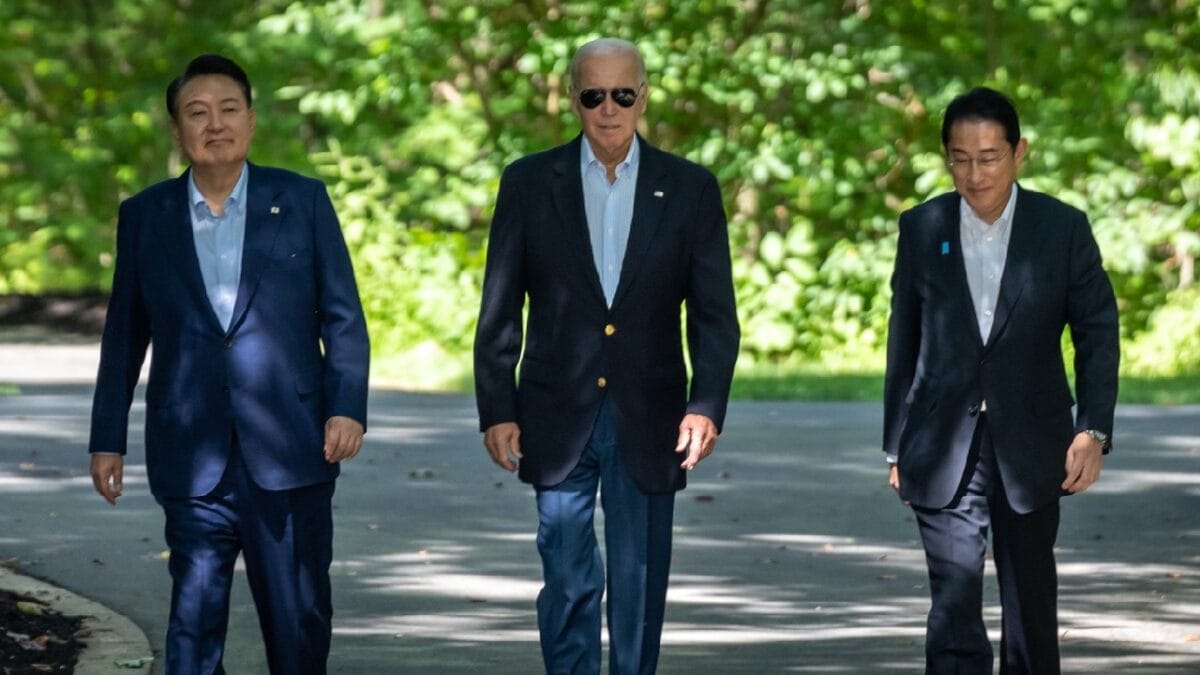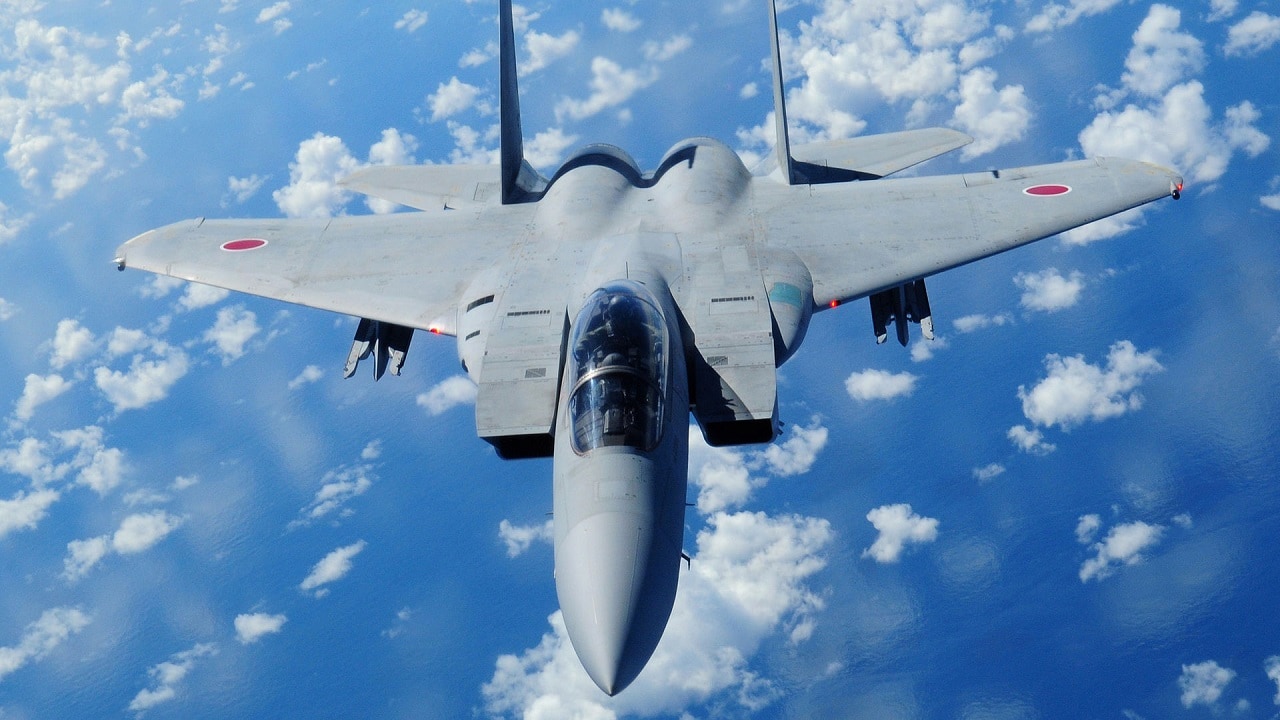How big of a deal is the Camp David summit that brought together Japan, South Korea, and the United States for major multilateral talks on security issues?
The talks reportedly included discussions of intelligence sharing, crisis management, supply chain security, and anti-submarine warfare.
The summit suggests immense promise for bringing together Northeast Asia’s chief democracies, but much work remains.
A Strained History
To say that South Korea and Japan have a fraught history is an understatement. Their long relationship is complicated by every factor that could possibly bedevil relations between two neighbors.
Japan attempted a violent colonization of Korea that collapsed in the face of heroic resistance, but relations between the two states were strained even under the general umbrella of Chinese regional hegemony. The collapse of that hegemony in the late 19th century allowed both states a greater degree of independence. Japan took advantage of this changed state of affairs to conquer and colonize Korea after the Russo-Japanese War.
The atrocities typical of a colonial regime marked Japan’s occupation of Korea. Those arguing on Tokyo’s behalf make the standard case that the colonial power brought civilization, economics, and the improvement of national infrastructure, but these arguments fail to sway any minds in Korea. The brutality of Japanese occupation during World War II, when the Korean population was subjected to extraordinary demands, left a legacy of deep mistrust and abiding tensions. In the wake of the 1950-1953 Korean War, the North Korean regime made anti-Japanese propaganda a core of its survival strategy. This necessarily affected South Korea’s relations with Japan, as Seoul’s political elite needed to deflect charges of colonial collaboration.
Japan’s long-term unwillingness to come to terms with the brutality of its colonial regime made reconciliation even more difficult, even as South Korea underwent a democratic transition and significant cultural and economic ties developed between the two nations.
Progress Is Fragile
Any reconciliation between Japan and South Korea is at risk of disruption by right-wing nationalists in Japan and by right- and left-wing activists in the Republic of Korea. Efforts toward reconciliation are also undoubtedly susceptible to the bad behavior of neighbors in the region. North Korea obviously gets a vote, and both Russia and China are likely to use their disinformation machines to generate animosity between Seoul and Tokyo. For its part, the Biden administration will struggle to convince anyone in Asia of the concreteness of U.S. commitments in the face of another Trump presidential candidacy.
Moreover, the partners in the relationship have different interests. North Korea is a major annoyance for Japan and the United States, but an existential problem for South Korea. By contrast, Seoul has been far less willing than Tokyo or Washington to admit that relations with Beijing are necessarily adversarial. Japan and especially South Korea have been much slower than Washington to accept the need for a robust defense of Taiwan.
Great Promise
The war in Ukraine and tensions across the Taiwan Strait have drawn sharp lines across global politics, making it more difficult for middle powers such as South Korea to chart an independent course. While much of the rhetoric associated with the summit focused on the ongoing threat of North Korea, the real long-term target for the coalition is China.
The prospect of missile defense cooperation between Japan, the U.S., and South Korea is a threat to China in both conventional and nuclear terms. Seoul has given no clear sign that it would participate in any Taiwan Strait dispute, and most analysts suggest that the ROK would sit on the sidelines. But Chinese military planners must worry about the implications of South Korea’s role in such a conflict. South Korean participation would leave northern China considerably more vulnerable and would offer the United States a plethora of additional basing options.
The advantages are not limited to military cooperation. Japan and South Korea have technologically sophisticated economies that have produced equally sophisticated defense industrial bases. Cross-strait investment and technology transfers could increase the already considerable power of each nation.

Camp David, President Biden hosted President Yoon of the Republic of Korea and Prime Minister Kishida of Japan for a historic trilateral summit.
Much work remains in building trust between Seoul and Tokyo, but the potential gains are immense. Japan and South Korea are both spectacularly wealthy and very powerful.
No toxic relationship outlasts geopolitical reality forever. Germany, France, and the United Kingdom are close allies despite fighting two catastrophic wars in the last 110 years. Poland and Germany are similarly on good terms, and Washington’s relations with Hanoi are improving despite the legacy of the Vietnam War. Indeed, the fact that the United States incinerated the greater part of urban Japan in 1945 (including with a pair of nuclear attacks) has not impaired the growth of one of the world’s tightest alliances.
The Seoul-Tokyo-Washington axis could help determine the structure of security politics, not only in Northeast Asia, but across the entire Indo-Pacific.
About Author Dr. Robert Farley
Dr. Robert Farley has taught security and diplomacy courses at the Patterson School since 2005. He received his BS from the University of Oregon in 1997, and his Ph. D. from the University of Washington in 2004. Dr. Farley is the author of Grounded: The Case for Abolishing the United States Air Force (University Press of Kentucky, 2014), the Battleship Book (Wildside, 2016), Patents for Power: Intellectual Property Law and the Diffusion of Military Technology (University of Chicago, 2020), and most recently Waging War with Gold: National Security and the Finance Domain Across the Ages (Lynne Rienner, 2023). He has contributed extensively to a number of journals and magazines, including the National Interest, the Diplomat: APAC, World Politics Review, and the American Prospect. Dr. Farley is also a founder and senior editor of Lawyers, Guns and Money.

